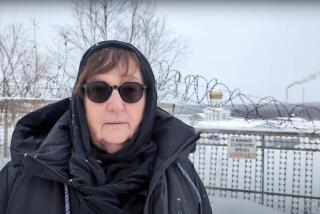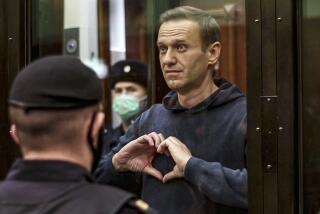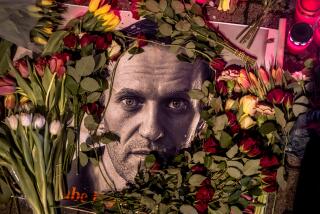Russian who urged Arctic conservation is unbowed after Putin’s insult
MOSCOW — Political science professor Sergei Medvedev, a longtime lover and explorer of the Arctic, drew the ire of Russian President Vladimir Putin when he recently called for international protection of the icy northern region in the face of economic development plans.
Last month, Putin called Medvedev, who teaches at the Higher School of Economics in Moscow, “a moron.”
The incident prompted a nationwide discussion of the Arctic and coincided with the arrest of 30 Greenpeace activists protesting a Russian oil drilling project in the region.
Medvedev, 46, who anchors popular television shows and studied and worked for 15 years in the West, spoke to The Times last month at the Architecture Museum in downtown Moscow.
What is happening in the Arctic today that should raise concern among the international community?
Many in Russia view the Arctic as a big pie and our oil companies are heading off into its reaches. I think the Arctic is now on the threshold of a tectonic ecological shift which bodes a catastrophe if its shelf is subjected to massive deep-water drilling and should it become a massive shipping thoroughfare. Given the challenges of the region: harsh weather conditions, icebergs and fields of ice, sudden and wild storms, it makes accidents all but unavoidable, such as oil spills from tankers and drilling platforms on a scale compared to which the [2010] oil spill in the Gulf of Mexico may appear a minor incident.
You have been promoting the idea of international control over the Arctic, haven’t you?
No one should have sovereign control over the Arctic like no one has sovereign control over the Antarctic. True, it is a huge seawater area, a significant part of which lies in the Russian exclusive [200-nautical-mile] economic zone where Russia can do deep-water drilling. But Russia prefers to see this as a situation in flux and wants to prove that its shelf reaches from its continental part all the way to the North Pole. It is quite symbolic that ... in its [Sochi 2014] Olympic torch ... relay, the torch was taken to the North Pole in a festive ceremony, as if marking the territory.
What is the role of Russian energy giant Gazprom in all of this?
They don’t possess any proven technology of drilling in Arctic conditions, let alone cutting-edge technologies. Such technologies don’t exist and no one has done that yet. But Gazprom was the first to undertake this Arctic gamble. Ten months a year the sea is frozen, so Gazprom now has to build a large fleet of icebreakers, for which it can claim huge state subsidies.
What is the problem with the Prirazlomnaya oil drilling platform, which belongs to a Gazprom subsidiary?
Prirazlomnaya platform is a parody of any serious approach to oil drilling, especially in the Arctic. Manufactured in 1984 it was written off in 2002 [as] having exhausted its resource and then suddenly sold to Russia as a top part to be towed and mounted on an underwater carcass [60 miles off the coast of Russian Novaya Zemlya] — a written-off Norway platform top resting on a rusty Russian structure stuffed with Russian-made unreliable and faulty equipment. For two years they were desperately trying to make it work, one accident on top of another. When and if it is brought into motion it will become potentially a huge, dangerous bomb with its 100,000-ton storage tank.
Mind you, an oil spill in the Arctic is far more dangerous [than one in the Gulf of Mexico], given its potential environmental implications.
Just imagine thousands of tons of oil leaked under fields of ice in the middle of the Arctic night. This said, oil doesn’t decompose in freezing cold water as it does in the warm seawater of the Gulf of Mexico. It will stay there for decades, killing every living organism in the vicinity. It will be worse than a horror movie catastrophe.
The Kremlin however treats Prirazlomnaya as a symbol of national sovereignty, the frontier bastion of Russia we need at all means to guard and protect from Greenpeace pirates and insidious attacks from the West.
What do you think about the arrest of the Greenpeace activists who were trying to climb the side of Prirazlomnaya to protest oil drilling in the Arctic? They face now up to seven years in prison for hooliganism.
The activists sitting now in Murmansk prisons are here on behalf of humanity, but they were in fact primarily protecting Russia’s interests because we will be the first casualty should Prirazlomnaya suffer a major spill.
Did the arrest of Greenpeace activists come as a surprise to you?
The reaction to the Greenpeace action was totally disproportionate, bordering on hysterics, the way the Kremlin more than once reacted hysterically to the Pussy Riot [music group], to the Sergei Magnitsky Act [adopted by U.S. Congress], to various opposition activities in the country. The authorities over and over again use all these occasions as information pegs to demonstrate that Russia is in danger. Now Russia indulges in the classical policy of past centuries creating images of enemies all around and making enemy lists, which now include homosexuals, blasphemers, opposition activists, Greenpeace. Thus a syndrome of being surrounded by enemies in a besieged fortress is imposed on the society.
What was your message on the Arctic which got such an aggressive response from Putin personally?
My message is that the greater Arctic should belong to the entire humanity, which in effect should mean a ban on oil drilling and any economic activity and a ban on military actions and movements, on nuclear tests, on deployment of military bases. It is not for nothing that [the] Greenpeace call “Save the Arctic” was supported by 5 million people around the world including many Russians. The Arctic should become like the Antarctic: open for scientific research, tourism and any noncommercial expeditions. In other words, I am for turning the Arctic into a huge biospheric preserve. In the long-term perspective this is much more beneficial if you look at it through the green economy eye, treating nature not as a resource but as investment capital.
Why then did it prompt Putin to publicly refer to you as “a moron”?
Well, Putin was told [at a meeting with United Russia party activists in October] that there is a certain professor who suggested that the Arctic be taken under international control, and he reacted. So it was not exactly an in-the-face insult, and I do not really feel offended. In a way I am kind of glad it happened because this president-versus-professor conflict caught up by the media opened up the floodgates for a most important public discussion about what we should and what we shouldn’t do in the Arctic.
Does his response fit his image of the zealous guardian of what’s left of the Russian empire?
Putin is famous for his lamentations about “the biggest geopolitical catastrophe,” the breakup of the Soviet Union, and takes any issue of sovereignty very personally. After what he sees as two decades of shame before he came to power, Putin views himself as a man who brought Russia up from its knees and is consolidating its integrity, which resulted in the completion of the war in Chechnya, in taking [Georgian breakaway republics of] Abkhazia and South Ossetia under Russia’s wing, in promoting the idea of a Eurasian union. So he views his policy toward the Arctic exactly in this context, like part of a grand project of getting Russian lands back together.
What does it all tell us about the Russia Putin built?
This syndrome has been carefully shaped by the Kremlin since about 2003 when, lured by promise of economic and political reform, I returned to Russia after 15 years of living in the West. The evolution of Putin in the last 10 years since the arrest and imprisonment of [oil tycoon Mikhail] Khodorkovsky on a historic scale has combined with the objective logic of Russian history which has gradually turned Russia into a neo-medieval, autocratic, clan-structured, raw-materials-providing state.
Putin is not just a leader as he is the embodiment of the security and power clan which presides over the redistribution of property and resources. Putin stands alone on the very top of the gigantic pyramid he built, but at the same time he is [a] hostage of his creation.
More to Read
Start your day right
Sign up for Essential California for news, features and recommendations from the L.A. Times and beyond in your inbox six days a week.
You may occasionally receive promotional content from the Los Angeles Times.






